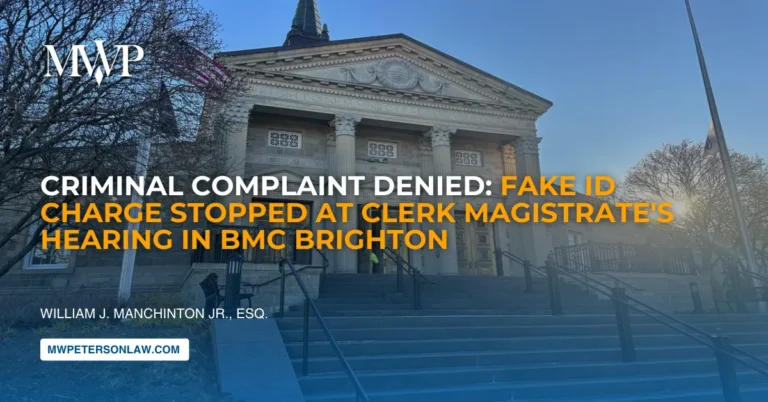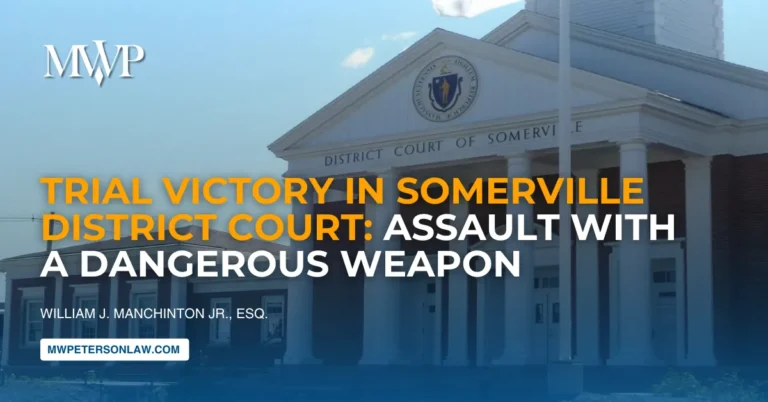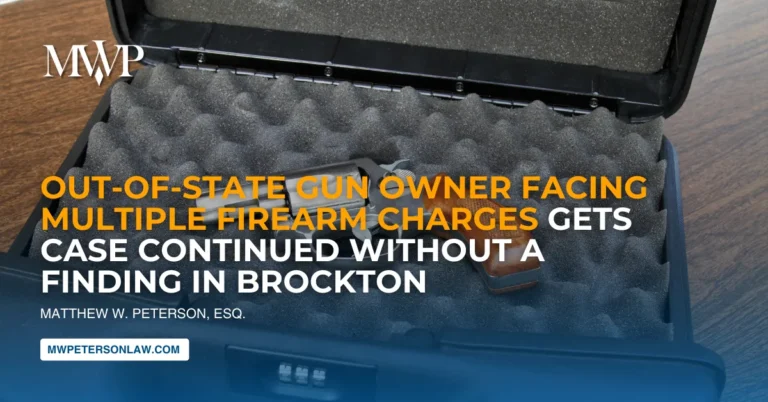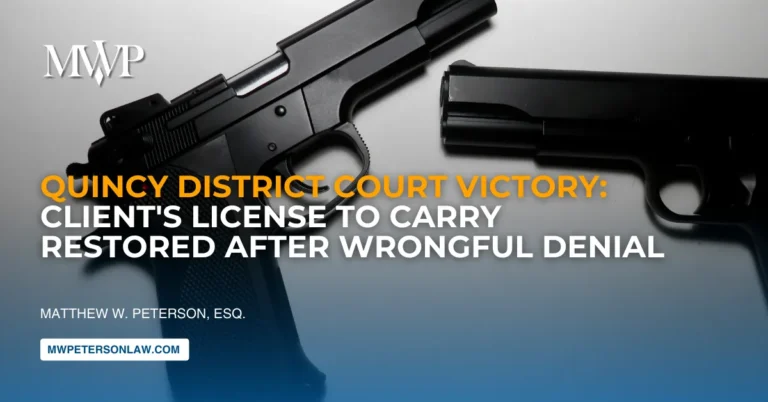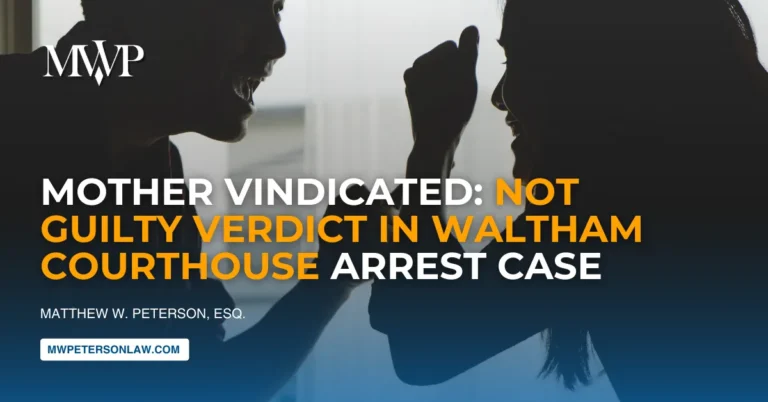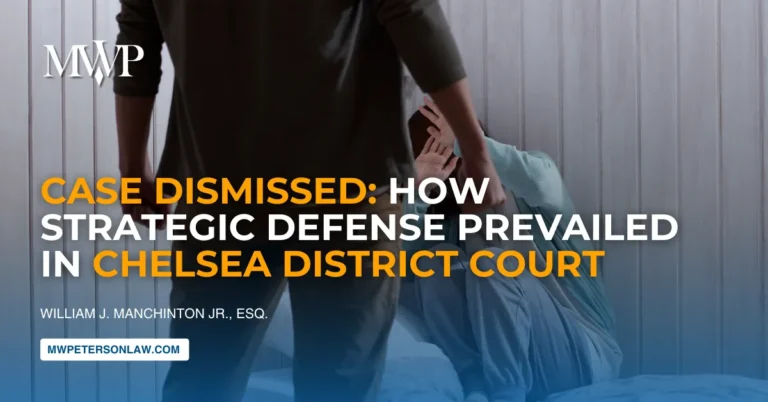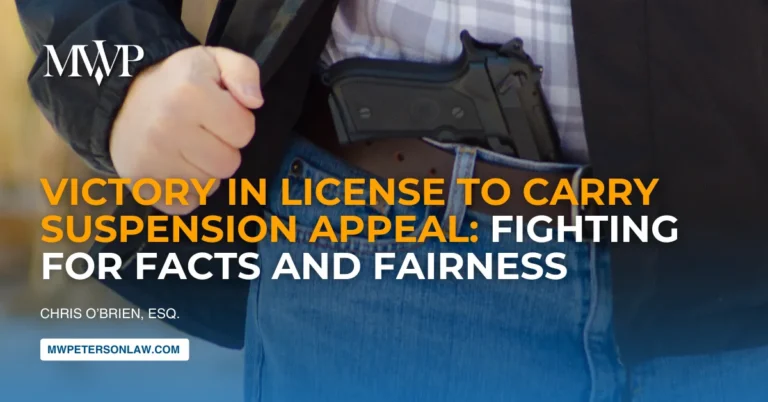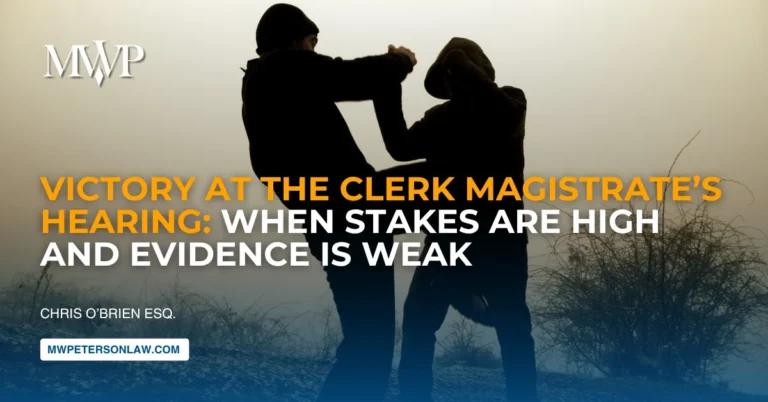Facing criminal charges can be overwhelming, especially when your constitutional rights and freedom are at stake. Last month, the Law Office of Matthew W. Peterson secured a complete victory for a client in Chelsea District Court who was facing exactly this situation. This firearms case illustrates how improper police conduct can significantly alter someone’s life.
The Charges Our Client Faced
Our client was charged with a serious firearms offense in the Chelsea District Court that carried an 18-month mandatory minimum sentence. This means that if convicted, the judge would have had no choice but to send him to prison for at least a year and a half – there’s no flexibility with mandatory minimums, no matter what the circumstances.
For anyone facing firearms charges, this kind of sentence can feel like a crushing weight. But sometimes, the way police gather evidence matters just as much as the evidence itself.
What Led to the Arrest
The trouble started when our client’s ex-girlfriend called the police, claiming he had threatened her. When officers responded to the scene, they immediately removed our client from the vehicle he was driving and began searching through the car without his permission.
During their search, police found a firearm in the back seat, hidden under some items. Based on this discovery, our client was arrested and charged with the firearms offense.
The police tried to justify their search by claiming they conducted what’s called an “inventory search” – a specific type of search that’s only allowed under particular circumstances.
Understanding Inventory Searches
An inventory search sounds official, but it has very specific rules. Police can only do this type of search when they impound a vehicle for legitimate reasons – like when a car has expired registration or when a driver gets arrested and there’s no one else who can legally drive the car away.
The purpose of an inventory search is supposed to be protecting everyone involved. Police document valuable items before storing the vehicle, which protects both the car owner from theft and the police department from false claims about missing property.
But here’s the key: police must actually be conducting a genuine inventory, not just looking for evidence to use against someone.
Building Our Defense Strategy
We immediately began gathering every piece of evidence related to this case. This included the officers’ body-worn camera footage, all police reports, and other documentation from the incident. This thorough preparation became the foundation of our defense.
We then filed a motion to suppress evidence and prepared for a hearing in Chelsea District Court. A motion to suppress is like asking the judge to throw out evidence because police obtained it illegally – think of it as spoiled ingredients that can’t be used to build a case.
During the hearing, attorney Matthew Peterson cross-examined several police officers involved in the search. Through careful questioning, we showed significant differences between what the officers said happened in court versus what their own body camera footage actually revealed.
The Key to Our Victory
The breakthrough came when we demonstrated that the officers weren’t really conducting a proper inventory search at all. A true inventory search focuses on documenting and protecting valuable items in an impounded vehicle. But the evidence showed these officers weren’t trying to catalog belongings for protection – they were searching because they wanted to look through the car for evidence.
This distinction matters enormously in firearms cases. Police can’t simply claim they’re doing an inventory search when they’re actually conducting an evidence-gathering expedition without proper justification.
Complete Victory in Chelsea District Court
After examining all the facts and evidence we presented, the judge made several crucial rulings that completely transformed our client’s situation.
The court found that police had no probable cause or reasonable suspicion to stop our client initially. This means officers didn’t have sufficient legal justification to pull him over or detain him in the first place. The judge also ruled that police had no legal basis to order our client out of his car, which led to the search that followed.
Most importantly, the court determined there was no evidence that our client had committed any crime that would justify the police actions taken against him.
Based on these findings, the judge granted our motion to suppress evidence in this firearms case. The court ordered that the firearm and all other evidence obtained during the illegal stop and search cannot be used against our client in the Chelsea District Court.
This ruling means the firearms charges against our client will eventually be dismissed. Our client went from facing an 18-month mandatory minimum jail sentence to potentially having his charges completely thrown out. It’s a complete transformation that demonstrates what’s possible when constitutional rights are properly defended in firearms cases.
Why This Chelsea District Court Victory Matters
This case represents more than just one person avoiding jail time for a firearms offense. It reinforces fundamental constitutional protections that safeguard everyone in our community.
The Fourth Amendment protects all of us from unreasonable searches and seizures, regardless of the accusations we might face. Police must have proper justification for stops and searches, and they must follow established legal procedures – especially in serious cases like firearms offenses.
When officers don’t follow these rules, courts have both the power and responsibility to exclude improperly obtained evidence, even in firearms cases with serious potential consequences.
Understanding Your Rights During Police Encounters
If you ever find yourself stopped by police, remember that you have constitutional rights, even if you’re ultimately charged with firearms offenses or other serious crimes. You can politely decline to consent to searches by saying, “I do not consent to a search.”
If officers proceed with a search anyway, don’t physically resist. Instead, clearly state your lack of consent and let an experienced Boston criminal defense attorney challenge the search later in court, just as we did in Chelsea District Court.
The Importance of Experienced Legal Representation
This firearms case reminds us why having knowledgeable legal representation matters so much. Most people facing charges in Chelsea District Court or elsewhere might not realize when their constitutional rights have been violated or understand how to properly challenge police procedures.
Every firearms case is unique, with specific facts and circumstances that require careful analysis. What worked in our Chelsea District Court victory might not apply to different situations, which is why it’s essential to have an experienced attorney who can evaluate the particular details of each firearms offense.
If you or someone you know is facing firearms charges in Chelsea District Court or elsewhere, don’t assume police followed proper procedures. Constitutional violations happen more often than people realize, and challenging improper police conduct is a critical part of protecting everyone’s rights – especially in serious cases involving firearms offenses, where the stakes are so high.




